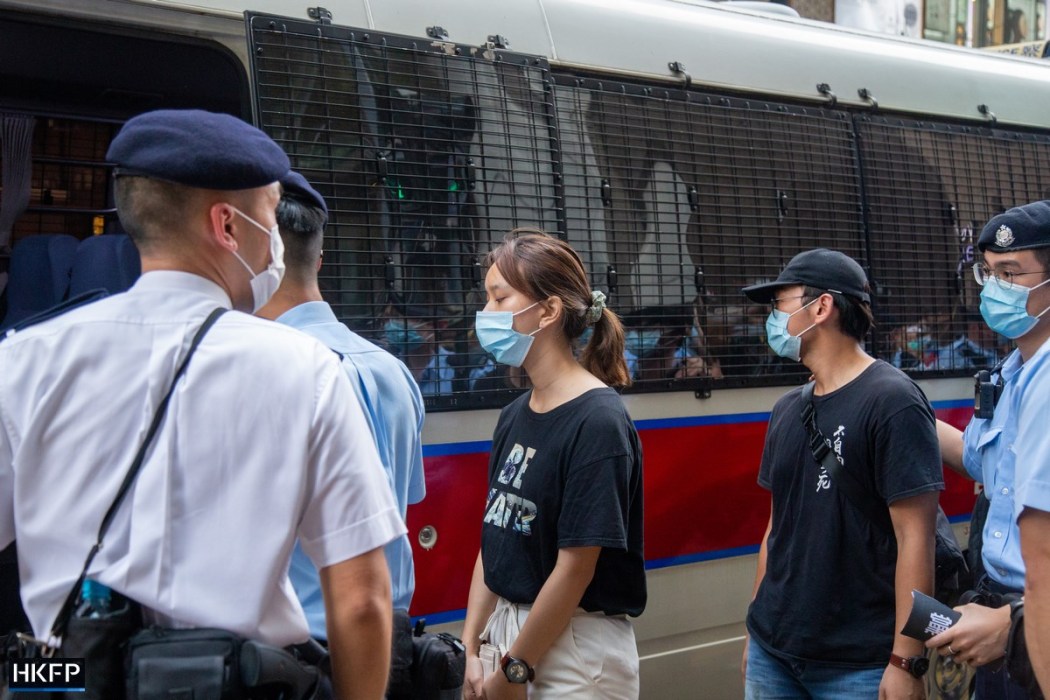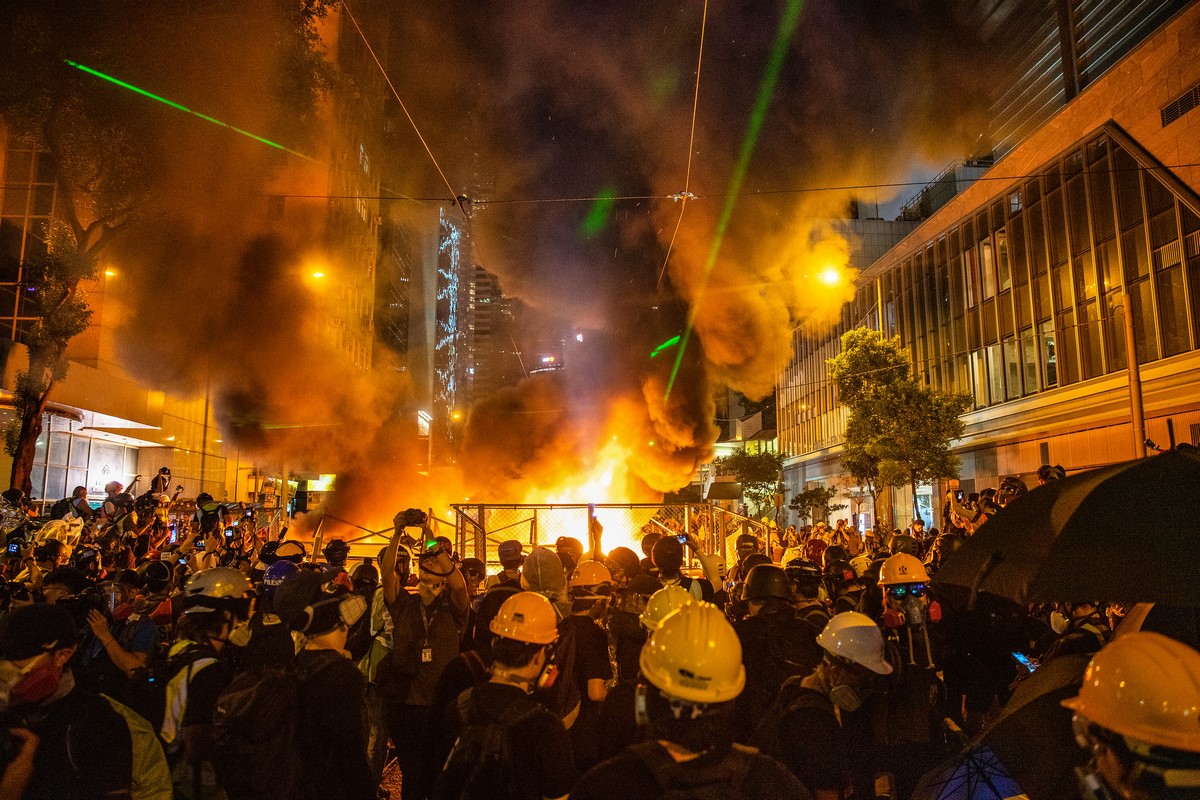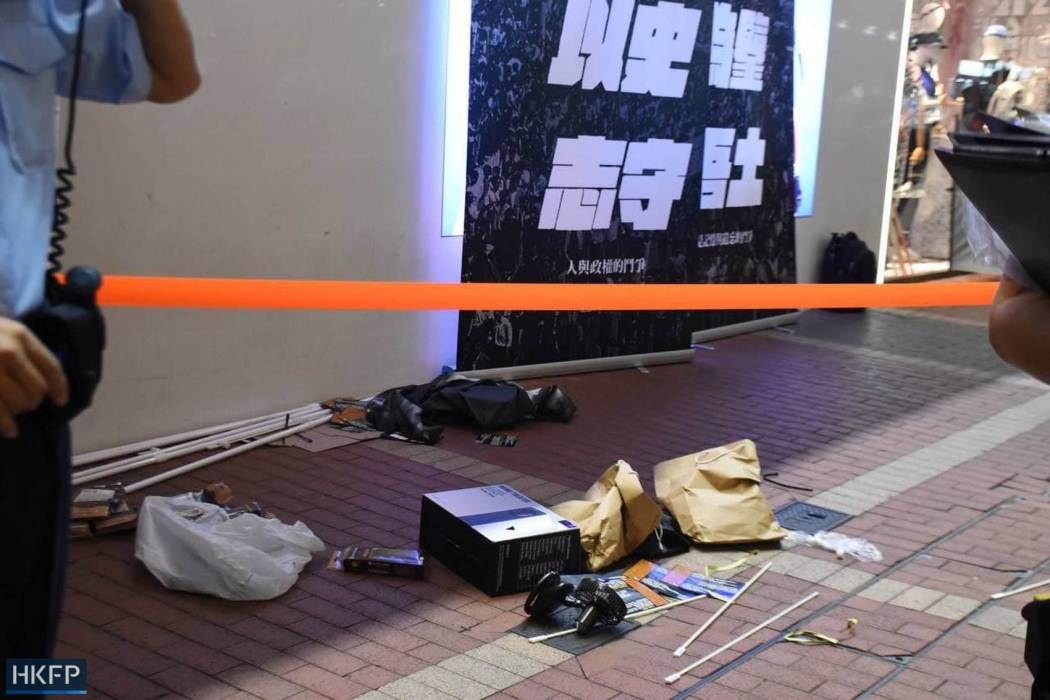Hong Kong activist Wong Yat-chin – arrested three times in just over a month over pro-democracy street booths – says his group Student Politicism wants to “bring hope to people” as the space for activism shrinks due to the national security law.
Most recently, the 20-year-old was picked up by police in Mong Kok on July 1, when Hong Kong marked 24 years since its handover to China. For the first time in more than two decades, there was no large-scale pro-democracy rallies on that day because of a police ban citing Covid-19 risks.

Some local democracy campaigners – including members of Student Politicism – turned instead to setting up street booths. The group initially planned a presence in Causeway Bay, but had to think again after police sealed off main streets in the shopping district.
Wong moved to Mong Kok and decided he would merely hand out leaflets, with no flags or speeches through a megaphone. But he still found himself surrounded by tight orange-tape police cordons and dozens of officers as soon as he arrived in Soy Street.
“We only brought several hundred copies of publicity material but I was surrounded by [police] just seconds after I arrived and was arrested for [distributing seditious publication],” Wong, the convenor of Student Activism, told HKFP in a phone interview on Tuesday.
Wong was arrested along with the group’s secretary general Chan Chi-sum and a female volunteer. As he was being escorted to a police vehicle on Nathan Road, he shouted: “Hongkongers, hang in there!”

Shortly afterwards 19-year-old Alice Wong, the spokesperson for Student Politicism, was also detained, outside Langham Place mall. The student activists were accused of handing out seditious material, an offence under the British colonial-era Crimes Ordinance. They were released on police bail the next day.
‘Fluctuating’ red lines
Student Politicism was founded in May last year and is one of the few local pro-democracy organisations to press on with street booths despite the enactment of the national security law on June 30, 2020.
The sweeping legislation outlaws secession, subversion, collusion with foreign forces and terrorist acts, with a maximum penalty of life imprisonment. So far, more than 120 people – including former legislators, high-profile activists, journalists and secondary students – have been arrested under the Beijing-imposed law.
Wong said he thought the “red line” – marking what is officially deemed as legally permissible – was “fluctuating” but was still tightening around him.

“The previous red line was not allowing people to say the ‘Liberate-revolution’ slogan… but now it feels like anything that I do could be seen as a crime,” he said, referring to the “Liberate Hong Kong, revolution of our times” slogan. The government says it breaches the security law because of its “pro-independence and secessionist” connotations.
In an earlier interview with HKFP in March, Wong described holding street booths as a “compromise” after attempts to secure police approval for a march or rally were in vain.
He said such booths were a very “wo lei fei” form of resistance. The Cantonese phrase emerged during the months-long unrest in 2019, in reference to demonstrators who supported peaceful, rational and non-violent protest.
“If I had a choice, I would apply to organise a march. But I couldn’t, so I organised street booths to keep people’s attention [on current affairs] and to build up the group’s reputation,” he said.
No marches have been approved for more than a year, with Covid restrictions often cited as the reason.

The Student Politicism convenor has been arrested five times since last September. Apart from “distributing seditious publications,” Wong must report to police over alleged offences including unlawful assembly, disorderly behaviour in public, inciting others to take part in an unlawful assembly and publicising and publishing an unauthorised assembly. He has not yet been formally charged.
Wong said back in March that his group aimed to “enlighten” people, especially students, to encourage them to pay attention to local politics. He said he himself had little knowledge of or interest in politics back in 2019 despite his involvement in the anti-extradition bill protests.
“During the lows of the movement, I began to reflect on my ideology and asked myself why my original target was the 30,000 police officers, but not the regime behind them? I thought I was so ignorant,” said Wong, who was a secondary five student in 2019.
“I was full of passion when I went out [onto the streets], but actually I wasn’t sure what the ultimate goal of going out was,” he said in March.

But Wong said on Tuesday the group has dropped plans to use the booths to awaken interest in socio-political issues. It was too difficult to “wake up” those who remained politically apathetic following the 2014 Occupy Central Movement, the 2016 Mong Kok “riot” and the 2019 unrest, he added.
Hongkongers, he said, had “banded together through suffering” over the past two years, citing the citywide protests in 2019 and the passage of the security law last year, but were now disheartened and in danger of becoming disunited.
“Our goal now is to use street booths to let others see that there are people still persisting. Rebuilding their hope and discussing Hong Kong’s future will be the main focus of the group hereafter,” Wong said.
Police keep an active lookout for Student Politicism’s street booths. Group members are accustomed to being stopped and searched, or seeing different warning flags unfurled at their booths, including a purple one which warns of potential national security violations.

They have also been ticketed over 30 times for allegedly breaching the Covid-19 restrictions on public gatherings.
In the past month, Student Politicism has apparently been targeted increasingly frequently. Wong was arrested on June 4 at a street booth to commemorate the anniversary of the 1989 Tiananmen Massacre.
He and spokesperson Alice Wong were also arrested on June 11 ahead of a protest anniversary street booth, over accusations of inciting others to take part in an unlawful assembly and publicising and publishing an unauthorised assembly.
Police cited the group’s social media posts and said they advocated violent protests. Convenor Wong was arrested again on July 1.

Student Politicism would continue setting up street booths and doing what it could, but Wong admitted he must now carefully weigh the risks against the benefits – saying he may not organise an activity on “special dates” such as protest anniversaries.
“Does it deserve me taking such major risks? I may hesitate… I guess I also have a red line for myself,” he said.
Student Politicism has also begun refusing direct donations to avoid accusations of money-laundering.
Asked what Student Politicism would do if barred from putting up street booths, Wong said the group may have no choice but to organise private events instead, such as a reading club that would allow more “in-depth exchanges.”

“Perhaps in the future, the public political space in Hong Kong will shrink further. But we can still try to connect with people through other social issues,” he said.
“No matter how the authorities crack down on civil society, the political power hidden in society is beyond estimation.”
Support HKFP | Policies & Ethics | Error/typo? | Contact Us | Newsletter | Transparency & Annual Report | Apps
Help safeguard press freedom & keep HKFP free for all readers by supporting our team
























